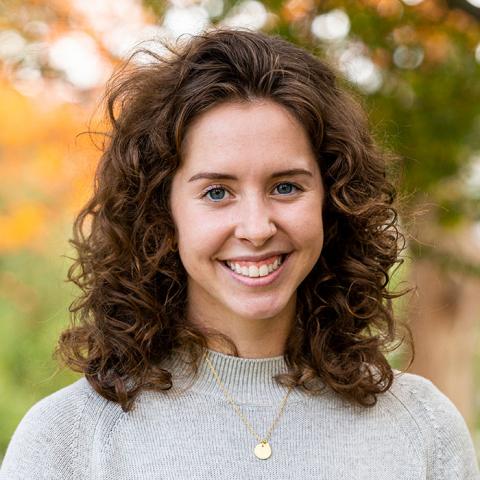Leading COVID-19 Relief Efforts in West Bengal

Saumya Varma '18 and her sister, Mahima, are continuing the work of their grandmother at Calcutta Foundation.
Details
Saumya Varma ’18 has led the Calcutta Foundation through the pandemic and West Bengal’s largest storm in a century, helping provide relief to over 100,000 people in India.
Most people’s lives have been far from usual over the past year and a half. Saumya Varma '18 is no different. In September 2019, she began leading her first project at the Calcutta Foundation around women's healthcare access in rural India. By the end of 2020, she was leading the foundation as a director with her sister, Mahima Varma, through pandemic-, economic-, and storm-relief efforts.
Varma's grandmother, Shamlu Dudeja, started the Calcutta Foundation 25 years ago. It is now one of the oldest foundations in Kolkata, India, and supports communities around West Bengal with healthcare, education, and relief work.
Varma has been helping with the foundation from a young age: accompanying her grandmother on trips to villages around the state, helping run events, and getting to know the women the foundation served. When she graduated from Haverford in 2018 with a major in sociology, a minor in health studies, and a concentration in peace, justice, and human rights, she knew she wanted to return.
"I knew, even while in college, that I wanted to spend at least a couple of years working in India and the best way to make the largest impact was working with my family foundation, leveraging the network I have in Kolkata, working for the people I had grown up with," said Varma.
She spent her first few months back in Bengal talking to women in rural communities and heard that their most urgent need was quality healthcare which aligned with her interests as a health studies minor.
"Project Mayuri was started under Calcutta Foundation to address this need—to bring regular quality healthcare to the doorsteps of women living in rural Bengal," said Varma. "Just as we found our footing and had started regularly working with about five villages with this initiative, we were hit by the pandemic."
Projects were put on hold as the country went into lockdown, and the foundation started getting calls from local community leaders asking for help feeding workers unemployed because of the pandemic.
“As we started the work, we started receiving more calls, similar in nature, asking for help with dry rations, and we started responding to needs expressed by our people,” said Varma.
They reached out to family and friends to raise money to keep up their relief efforts, as the weeks of the pandemic stretched on. Communities’ needs kept changing—from masks to soap to baby food—and so did the challenges. Super Cyclone Amphan, the worst storm of the century, destroyed homes and villages in May 2020 and the organization's focus became providing temporary housing needs.
Then, in October, Varma and her sister took over as directors of the Calcutta Foundation.
They were able to restart long-term initiatives around gender equity until the second wave of COVID-19 cases in March 2021. Those cases brought the rest of India back into lockdown, but Bengal's response was delayed by the 2021 spring election—leading to higher disease spread.
The shortage of quality healthcare in rural Bengal, which Project Mayuri had started to address in early 2020, became an urgent concern when the second wave of cases spread fast in rural areas.
"Once again we were responding to needs for rations but this time around there was an added medical element—the need for tests, for doctors, for medical equipment along with food," said Varma. "So our efforts this year have included ration- and hygiene-kit distribution as well as an emphasis on information dissemination. We have been making and sending out informational and awareness videos on COVID, arranging free consultations with doctors, and more recently have been focusing on vaccine awareness, registration, and administration."
Varma's first months leading the foundation have been tumultuous, to be sure.
"It was obviously a journey that I never imagined I would be on when I started Project Mayuri in 2019,” she said. “Even in 2020, I believed we were taking a short pause. [I] never imagined that we would end up providing relief to almost 100,000 people in around 21 areas in West Bengal in 2020 alone. I didn't ever imagine that my sister and I would take over the running of the foundation."
Varma and the foundation's work continues. Their relief work focuses now on vaccinations including spreading awareness, getting people registered, and administering them when they get sponsorships. At the same time, they are trying to look beyond immediate relief.
"Our focus this year is on healthcare and employment-generation since what we are seeing is that the financial blow dealt by the first round of the pandemic has been doubled by the second wave since people have barely recovered from their 2020 losses," said Varma. "Our center or Kutirs (Hindi for Huts) in the villages are the focus of our efforts through which we are working on holding workshops, providing skills training and classes such as sewing, digital and financial literacy, cooking, pad making with the intent that women can either start their own small business, help find employment, or develop a skill that they can later leverage."
The foundation has accomplished a lot since the pandemic began. Varma has come a long way, too.
"It's definitely been challenging, it's been tough leading a foundation in such strange times, fundraising, making decisions in times of uncertainty—decisions that affect the lives and health of so many people. But it's also been a time of immense learning," she said. "It's been humbling to see the support and trust we have received—not only from our donors but also from the communities we work in. I've been grateful that I have had the privilege and the ability to work to help people during such tough times. But mostly it's just been an overwhelming and incredible journey."




